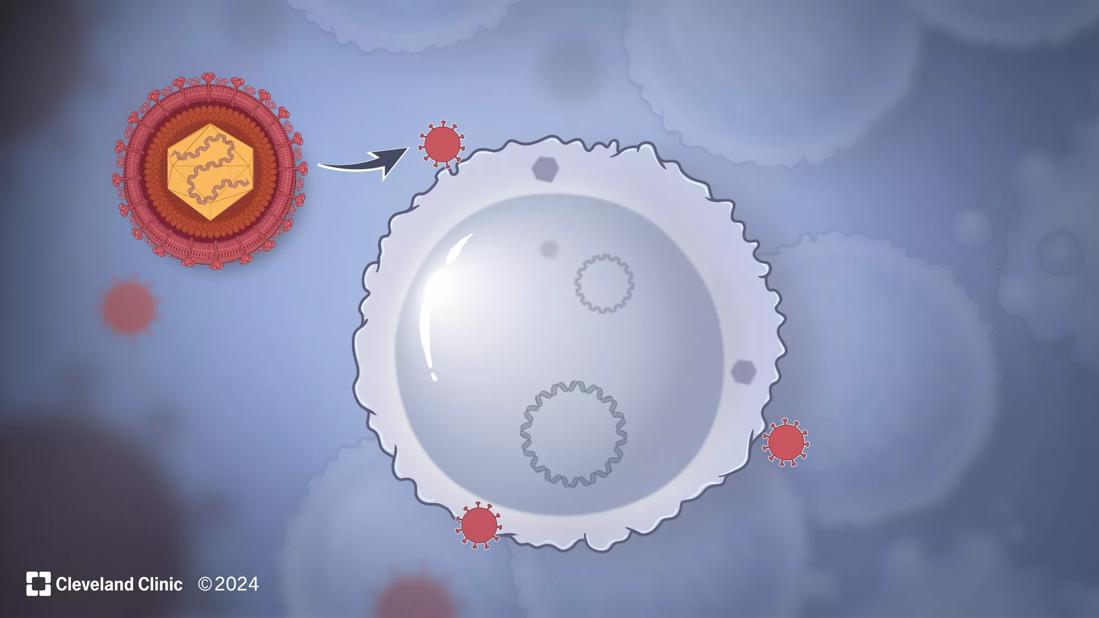Cleveland Clinic researchers discover what drives – and what may halt – virus-induced cancer

The herpesvirus KSHV causes several aggressive cancers, including Kaposi's sarcoma and primary effusion lymphoma. "Treatment for KSHV-induced cancers is limited to conventional chemotherapy, which suffers from drug resistance, so we're trying to find unique vulnerabilities of these cancers and target them through studying KSHV-host interactions," says Jun Zhao, PhD, who leads a research team at Cleveland Clinic Florida Research & Innovation Center.
Advertisement
Cleveland Clinic is a non-profit academic medical center. Advertising on our site helps support our mission. We do not endorse non-Cleveland Clinic products or services. Policy
The team’s research, which was recently published in Nature Communications, demonstrated that the human enzymes CDK6 and CAD are exploited by KSHV to promote cancer progression, and more importantly, how inhibiting this process with CDK6 and CAD inhibitors can reduce KSHV replication and shrink tumors in preclinical models.
KSHV-induced cancers are prevalent in immunocompromised patients, such as elderly people with ‘immunosenescence’, patients with HIV/AIDS, and/or organ transplant recipients. B-cell malignancies originating from KSHV have poor prognoses, even with active chemotherapy treatments. The virus is also a culprit in causing KSHV inflammatory cytokine syndrome (KICS, a systemic elevation of cytokines that includes interleukin 6 and 10), which is associated with a very high mortality rate. To date, our understanding of how KSHV causes cancers is limited.
The research team identified a mechanism for how KSHV manipulates cells by hijacking host proteins CDK6 and CAD, and how this mechanism is required to support viral replication and the growth of KSHV-infected cells. Based on this knowledge, they theorized that previously approved therapies that block CDK6 activity could be used to interrupt this manipulation by KSHV.
CDK6 inhibitors are already FDA approved to treat breast cancers. In cell culture models, the researchers found that CDK6 and CAD inhibitors blocked KSHV-driven cell metabolism and viral replication. This could be an important step to developing effective therapeutics for virus-induced cancers. Indeed, in preclinical models, both inhibitors were very effective at blocking the tumor progression of aggressive KSHV lymphomas.
Advertisement
"In our study, the cells carry a luminescence signal so we can visualize the tumor," explains Dr. Zhao. "After several weeks of treatment with the CAD/CDK6-blocking medication, that signal was virtually gone for some tumors. These studies show that doing so can help shrink tumors, overcome drug resistance and potentially help wake up the immune system.”
Video content: This video is available to watch online.
View video online (https://cdnapisec.kaltura.com/p/2207941/sp/220794100/playManifest/entryId/1_96r5sx11/flavorId/1_5f3sgelj/format/url/protocol/https/a.mp4)
Metabolic reprogramming is a typical feature for cancer cells. What the research team was looking to demonstrate was that oncogenic viruses also reprogram metabolism by modifying key metabolic enzymes. “People used to think of metabolic enzymes as sort of passive workers that synthesize and metabolize small molecules,” explains Dr. Zhao. “But we found that, surprisingly, some metabolic enzymes, like CAD, are very active drivers that regulate signal transduction and promote a systematic metabolic reprogramming. Our thought was that oncogenic viruses may evolve to use them to their benefit.”
Indeed, the team found that KSHV manipulates CAD not only for nucleotide synthesis, but also for glucose consumption regulation, both of which contribute to virus replication and cancer formation. Understanding how these viral manipulation mechanisms work – and how they can be interrupted – may provide clues for tackling these difficult-to-treat diseases.
These findings could lead to new therapies for viral-induced cancers as well as other types of cancer that use similar strategies to manipulate metabolic pathways. The next step would be to build on the team’s work by conducting clinical trials to validate their findings.
Advertisement
“We believe that applying inhibitors that target specific metabolic pathways may complement traditional treatments,” says Dr. Zhao. “Beyond that, these metabolic inhibitors may also be effective against infectious diseases, since more studies are showing that many viruses rely heavily on metabolic reprogramming to fuel replication.”
Advertisement
Advertisement

Research combining genomics, database analysis and RNA sequencing suggests possible role for antiviral drug therapy

Addressing rare disease and challenging treatment course in an active young patient

The latest evidence to support ‘practice-changing’ protocol—and a note of caution

Personalized reconstruction is an alternative to leg amputation or flail limb

Soft tissue pathologist discusses research into incorporating genomic data to improve risk stratification

Study measures real-world outcomes for relapsed or refractory large B-cell lymphoma

Optimized responses in transplant- and CAR T-cell therapy-eligible patients

Machine learning models assess intraoperative tissue perfusion